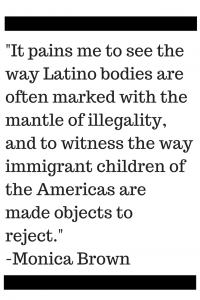 Monica Brown is the author of several award-winning
Monica Brown is the author of several award-winning ![]() children’s books, including the Marisol McDonald series, and is a Professor of English at Northern Arizona University. Brown recently spoke to KNAU Public Radio about the power of dehumanizing language after a politician used the word “deportable” to refer to an immigrant. She has allowed us to reprint her comments below, and you can hear her radio segment here:
children’s books, including the Marisol McDonald series, and is a Professor of English at Northern Arizona University. Brown recently spoke to KNAU Public Radio about the power of dehumanizing language after a politician used the word “deportable” to refer to an immigrant. She has allowed us to reprint her comments below, and you can hear her radio segment here:
Deportable. The prefix de signifies removal, separation, reduction or reversal, as in deforestation or demerit. De reverses a verb’s action, as in defuse ordecompose. De is not often used with a noun, but it was last week. That’s when Republican Representative Steve King referred to one of First Lady Michelle Obama’s guests as “a deportable.” He tweeted it.
When I heard this description of 21 year old Ana Zamora, a hardworking college student and DREAMer, it felt like a blow to the chest. When President Obama enacted his 2012 executive order on immigration, Ana Zamora wrote him a thank you letter. She said, “I am finally a person in the United States…”
Not according to Representative King. To him, she is a deportable.
I am a bilingual Latina whose mixed ethnic heritage lets me embrace the multiplicity, complexity and beauty of the Americas, North and  South. It pains me to see the way Latino bodies are often marked with the mantle of illegality, and to witness the way immigrant children of the Americas are made objects to reject, a class of “deportables” if we were to use King’s terminology. I suggest we don’t.
South. It pains me to see the way Latino bodies are often marked with the mantle of illegality, and to witness the way immigrant children of the Americas are made objects to reject, a class of “deportables” if we were to use King’s terminology. I suggest we don’t.
In migrating to the United States, Ms. Zamora’s parents brought with them their dedication to family, hard work, and dreams of a better future for their children. Ms. Zamora is the embodiment of those dreams. Chicana sage Gloria Anzaldua once described the U.S.-Mexico border as a “1,950 mile-long open wound.” It is a place of conflict, confrontation and pain. The term “a deportable” rubs salt in that wound by devaluing and dehumanizing a young woman who represents the very best of our country.
As a professor of English and children’s author, I know words matter. Within my community, an immigrant without documents might be described as “sin papeles.”Without papers. It is a legal status they lack, not who and what they are.
Thankfully, many have come to understand that, in the words of Holocaust survivor Elie Wiesel, “no human being is illegal.” Today I’d like to state, unequivocally, that no human is a deportable, either.
Further Reading
Visit Monica Brown’s website
Purchase Marisol McDonald Doesn’t Match or Marisol McDonald and the Clash Bash


I think she is a very great Latina poet